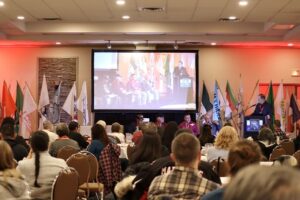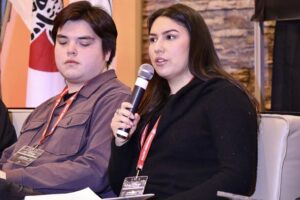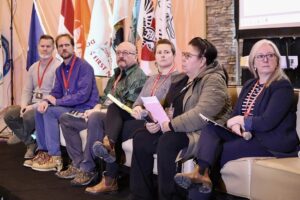Inherent rights highlighted at the 8th annual Anishinabek Nation Lands and Resources Forum

By Kelly Anne Smith
NORTH BAY— Concerns of climate change, extreme mining claims, and the health of the Great Lakes were heard over three days at the 8th annual Anishinabek Nation Lands and Resources Forum, Kina-Gego-Naabadosin – Everything is Connected, at the Best Western in North Bay, Ont., from February 13 to 15.
Presentations and workshops were given by Indigenous and industry experts, as well as government representatives, providing opportunities for networking and discussion on successes and challenges.
In opening remarks, Anishinabek Nation Northern Superior Regional Deputy Grand Council Chief Melvin Hardy, a citizen of Biinjitiwaabik Zaaging Anishinaabek says environmental issues must be prioritized. He spoke of concern that climate change and the erratic weather are affecting the harvesting livelihood of First Nation members.
“Up in Thunder Bay, we had a green Christmas in our area until probably in January. We know Mother Earth is trying to heal [herself] because of what’s occurring on our lands. A lot of people who harvest in the wintertime on the lakes are unable to do so because of the fact they can’t even go on the ice.”
Anishinabek Nation Grand Council Chief Reg Niganobe, a citizen of Mississauga #8 First Nation, says it is critical now more than ever to take scope of mandates and to communicate the latest efforts and collective work that is being done at the regional and community levels.
“The Anishinabek Nation as a whole is an incredibly diverse territory that is abundant in resources. We know this. Our communities all face unique challenges and a variety of hurdles when it comes to lands and resources. Finding balance between stewardship, building infrastructure, and creating sovereign wealth requires a careful and skilled approach,” he explained. “Right now, we are living in a world where we are seeing a drastically changing climate that is shifting our ecosystems and creating an urgent sense of direction that we must collectively work towards.”
Later, the Anishinabek Nation Leadership Panel talked of the lands and resources being affected in various ways across the various regions. The Leadership Panel included Anishinabek Nation Grand Council Chief Reg Niganobe, Northern Superior Regional Deputy Grand Council Chief Melvin Hardy, and Nmishomis Mike Esquega of Biinjitiwaabik Zaaging Anishinabek First Nation and Nmishomis Leroy Dolson of Munsee Delaware Nation, both representatives of the Getzidjig Advisory Council for the Anishinabek Nation.
Northern Superior Regional Deputy Grand Council Chief Melvin Hardy says the Northern Superior and Huron regions are most affected by mining. Grand Council Chief Niganobe talked of the United Nations Declaration on the Rights of Indigenous Peoples (UNDRIP) and free prior informed consent must be fully implemented in Ontario for First Nations to participate, give perspectives, and give permission for the land to be utilized.
“We have to be incorporated into all levels of government, both federal and provincial. There has to be an equal footing on all sides where we are equal with them. We deserve that as a First Nation’s peoples on this land.”
Nmishomis Dolson informed about a hydro line cutting through the land in the southwest region from Sarnia to London; Aamjiwnaang First Nation living in chemical valley and experiencing chemical spills; and the water problems with the Great Thames River.
“Several years ago, I used to swim in the river. I used to drink the water in the river. In 1959, it said do not swim in the river, it’s polluted. The youth have now initiated a study on how polluted the river is.”

During the Anishinabek Nation Councils Panel, Munsee Delaware Nation citizen Katelyn Peters of the Eshki-niigijig Advisory Council spoke about the need for updating youth at Anishinabek Nation gatherings.
“It is something the whole Eshki-niigijig Council has been wanting to do more of and be more proactive about is hold more regional sessions for the youth in our area. I think this would be a good opportunity to have these sorts of conversations, for example, on lands, water, resources…And some really great feedback that we had from this was at our Thunder Bay youth gathering in August…All of the youth that was at that gathering had something to say with regards to their community and the struggles that they were facing and how all the issues connect despite what region they are from.”
Paul Parete is the Environment and Climate Change Canada Great Lakes Program Officer. He led a presentation on Great Lakes: Lakewide Action and Management Plans Work Plan where discussions entailed a plan revealing the state of the ecosystems on how the lakes are doing and what stressors are on the lakes and the actions needing to be taken.
Afternoon sessions included the Ministry of Mines: Abandoned Mine Rehabilitation Program, Invasive Species Pathways and Prevention, as well as a new multimedia Initiative Biinaagami with Canadian Geographic and the Anishinabek Nation Commissioner on Governance Patrick Madahbee. A giant map of the great lakes was spread on the floor for participants to explore. The initiative will gather information to be added to the map from the 200 First Nations living in the Great Lakes watershed before bringing Biinaagami: Our shared responsibility to the Great Lakes to schools in the fall.
Day two of the 8th annual Anishinabek Nation Lands and Resources Forum opened with Nipissing First Nation Ogimaa Scott McLeod sharing remarks, including stating that one of the biggest threats lately, besides climate change in our territories, is the assertion of Métis.
“We only have so much resources in our territories. And these are our homelands. We maintain that there’s no distinct Métis Nations in our territories and they have no rights on our resources in our territories. We do acknowledge that the Métis Nations do exist and have a rich history, but it’s just not here.”
The Resource Development Panel on Forestry and Mining followed with Michipicoten First Nation’s Mineral Development Advisor David Ruffo and Hugh Martel, the Forestry Coordinator of Nipissing First Nation.

An informative presentation on Ontario Ministries of Mines, Northern Development, Natural Resources and Forestry, Indigenous Affairs, Environment, Conservation and Parks, and Agriculture, Food and Rural Affairs included updates and insight into the function of each respective ministry. Afterwards, Growing Solutions for Agriculture and Food Panel took place followed by break-out sessions.
On the Forum’s final day, Ian Ketcheson of Impact Assessment Agency of Canada presented then Anishinabek Nation’s Legal Department Director Fred Bellefeuille explained the United Nations Declaration on the Rights of Indigenous Peoples (UNDRIP), saying it is equal to human rights, which are part of the highest rights in Canada and society must accommodate human rights to the point of undue hardship.
“I was motivated to become a lawyer because in 1978, my grandma who could barely walk, I had to help her walk, I was 14 years old…because she was charged by the Ministry of Natural Resources for fishing out of season. She really got me to fight for our rights.”
Director of Lands and Resources and Economic Development Jason Laronde spoke of the consideration of future plans for the Anishinabek Nation Lands and Resources Forum to be held in communities.
Closing the 8th annual Anishinabek Nation Lands and Resources Forum, Gookmis Evelyn McLeod shared a prayer followed by a Travelling Song by the Boys from the Bay on Mother Earth Drum.


